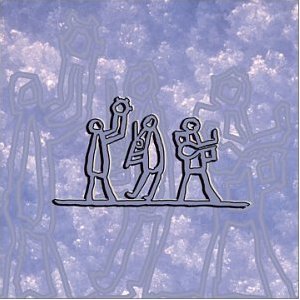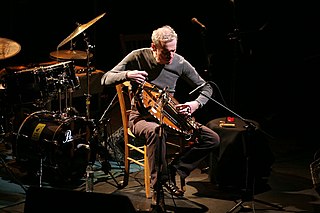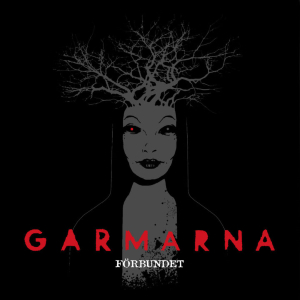Medieval metal is a subgenre of folk metal that blends heavy metal music with medieval folk music. Medieval metal is mostly restricted to Germany where it is known as Mittelalter-Metal or Mittelalter-Rock. The genre emerged from the middle of the 1990s with contributions from Subway to Sally, In Extremo and Schandmaul. The style is characterised by the prominent use of a wide variety of traditional folk and medieval instruments.

The hurdy-gurdy is a string instrument that produces sound by a hand-crank-turned, rosined wheel rubbing against the strings. The wheel functions much like a violin bow, and single notes played on the instrument sound similar to those of a violin. Melodies are played on a keyboard that presses tangents—small wedges, typically made of wood or metal—against one or more of the strings to change their pitch. Like most other acoustic stringed instruments, it has a sound board and hollow cavity to make the vibration of the strings audible.

Garmarna is a Swedish folk rock band. Their songs are mainly old Scandinavian ballads.

The nyckelharpa, meaning "keyed fiddle" or "key harp"(lit.), is a bowed chordophone from Sweden, similar in appearance to a fiddle or violin but larger, which employs key-actuated tangents along the neck to change the pitch during play, much like a hurdy-gurdy. The keys slide under the strings, with the tangents set perpendicularly to the keys, reaching above the strings. Upon key-actuation, the tangent is pressed to meet the corresponding string, much like a fret, shortening its vibrating length to that point, changing the pitch of the string. It is primarily played underarm, suspended from the shoulder using a sling, with the bow in the overhanging arm.

Falconer was a Swedish power metal band from Mjölby, formed in 1999 by the former guitarist of Mithotyn, Stefan Weinerhall. Falconer carried on many of the traditions set by Weinerhall's previous band and played a fusion style of power metal that utilizes folk instrumentation and melody to create a more medieval sound.
Hedningarna is a Swedish, and for some years partly Finnish, folk music band that mixes electronics and rock with elements from old Scandinavian folk music. Their music features yoik or juoiggus, a traditional Sami form of song.

Anders Norudde is a Swedish folk musician, multi-instrumentalist, and luthier. After finishing school, Anders took a job at the ironworks in Degerfors, where, in his spare time, he practiced orienteering and played rock music on the guitar. After hearing the band Kebnekajse on the radio, Anders became interested in the melodies of traditional Swedish folk music. He began attending folk music festivals in Ransäter, Värmland and was particularly inspired by the music of Anders Rosén and Mats Edén of Groupa.

The kobza, also called bandura is a Ukrainian folk music instrument of the lute family, a relative of the Central European mandora. The term kobza however, has also been applied to a number of other Eastern European instruments distinct from the Ukrainian kobza.

Keith "Mac" MacLeod, was an English musician who was a part of the Hertfordshire folk and blues scene from 1959 onwards. He played in St Albans alongside Mick Softley and Maddy Prior and toured with John Renbourn. Influences include Softley, Ramblin' Jack Elliott, Derroll Adams, Jesse Fuller, Big Bill Broonzy, Snooks Eaglin, Reverend Gary Davis and Davey Graham.

The willow flute, also known as sallow flute, is a Nordic folk flute, or whistle, consisting of a simple tube with a transverse fipple mouthpiece and no finger holes. The mouthpiece is typically constructed by inserting a grooved plug into one end of the tube, and cutting an edged opening in the tube a short distance away from the plug.

La Musgaña is a Spanish folk music ensemble, founded in 1986 by Enrique Almendros, José María Climent and Rafa Martin. The band incorporates various instruments such as the salterio, fiddle, hurdy-gurdy, bagpipes, flutes, guitar and bass, and performs traditional music from the Iberian peninsula, mostly from the Spanish regions of Castile, Zamora, Leon, Extremadura and La Mancha. La Musgaña means "water-rat" in Spanish.

The musette de cour or baroque musette is a musical instrument of the bagpipe family. Visually, the musette is characterised by the short, cylindrical shuttle-drone and the two chalumeaux. Both the chanters and the drones have a cylindrical bore and use a double reed, giving a quiet tone similar to the oboe. The instrument is blown by a bellows.

Hedningarna is the eponymous debut album by the Swedish band Hedningarna. It was released in 1989, when Hedningarna was still a group with three members. Unlike the other albums, the debut does not include amplified instruments and rhythm loops and is played entirely with acoustic instrumentation.
Loituma is a Finnish quartet whose members combine the Finnish vocal tradition with the sounds of the kantele. Loituma were selected Ensemble of the Year at the 1997 Kaustinen Folk Music Festival.

Dominique Regef is a French improvisor, composer, and musician specializing in stringed instruments: the cello, the rebec, the vièle à archet, and the Rajasthan dilruba. Dominique Regef is recognized as an exceptional soloist on the hurdy-gurdy; he is known for surprising and moving audiences with his sound on the instrument. His concerts, be it a solo recital or a small group performance, shock listeners from all over the world with their originality and their strength. He has performed in several well-known music festivals, including the International Baroque Music Festival, the Jazz à Luz festival and the Grenoble Jazz Festival. He is cited as one of the best examples of modern hurdy-gurdy playing.

The mandore is a musical instrument, a small member of the lute family, teardrop shaped, with four to six courses of gut strings and pitched in the treble range. Considered a French instrument, with much of the surviving music coming from France, it was used across "Northern Europe" including Germany and Scotland. Although it went out of style, the French instrument has been revived for use in classical music. The instrument's most commonly played relatives today are members of the mandolin family and the bandurria.

Michael Pospíšil is a classical bass, specialising in historically informed performance. He is the founder and leader of the ensemble Ritornello which performs music of the 16th and 17th centuries for voices and a great variety of instruments.

Förbundet is the seventh studio album by the Swedish folk rock band Garmarna. Released in 2020, it is their first album on the Season of Mist label. Unlike the previous album 6 and similar to albums before that, Förbundet is again dominated by traditional instruments, melodies and lyrics, although there are still numerous electronic influences. These were added in cooperation with Christopher Juul of Heilung who also produced the album. Most tracks tell sinister folklore stories but the album includes two original titles written entirely by Garmarna. Anders Norudde of Hedningarna, Maria Franz of Heilung and Swedish folk singer Ulf Gruvberg appear as guest musicians.














